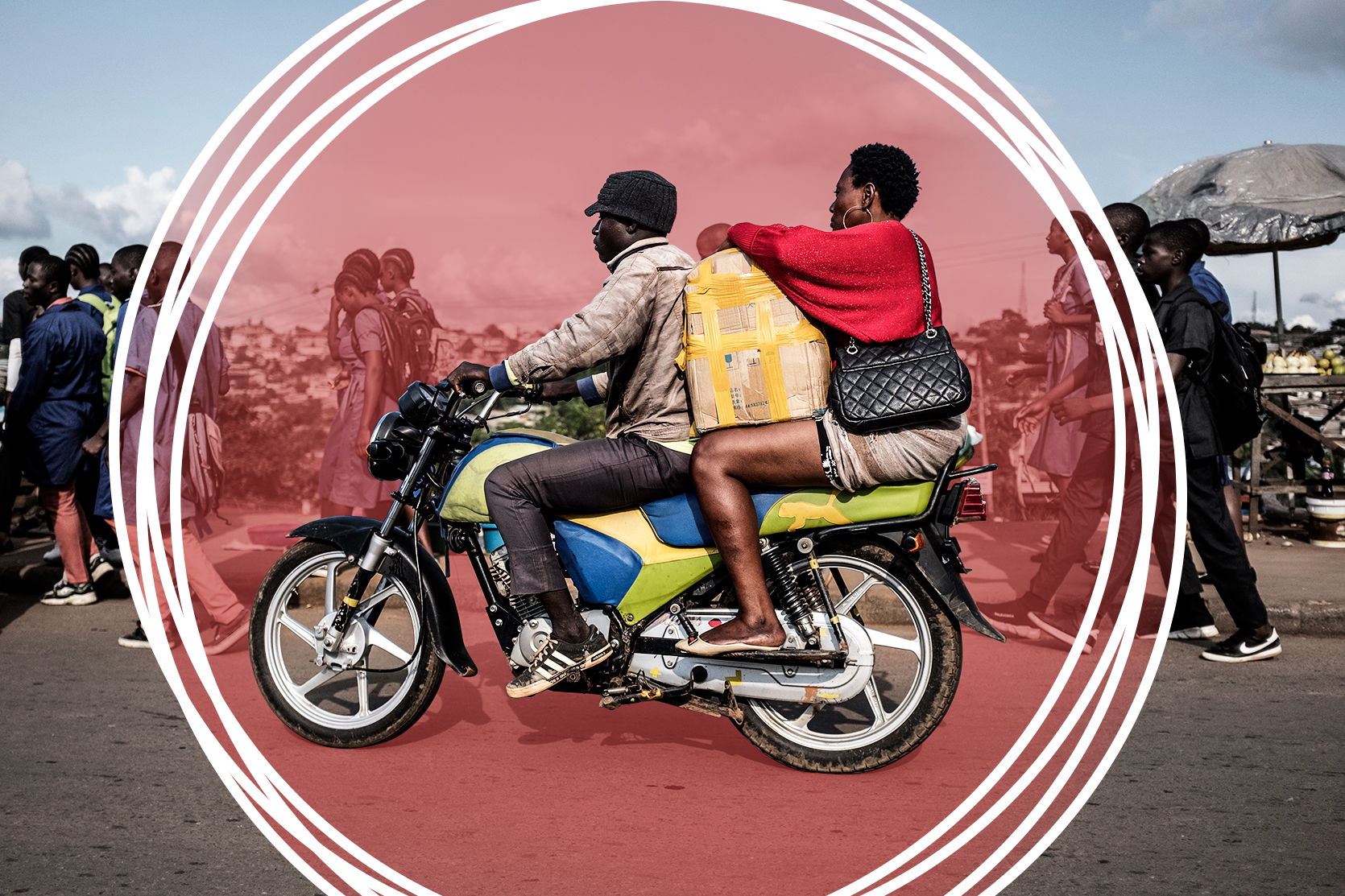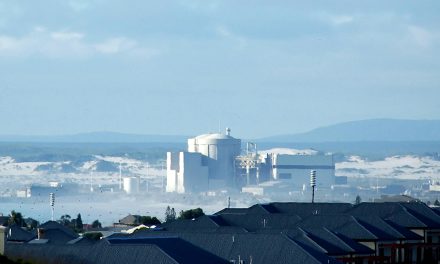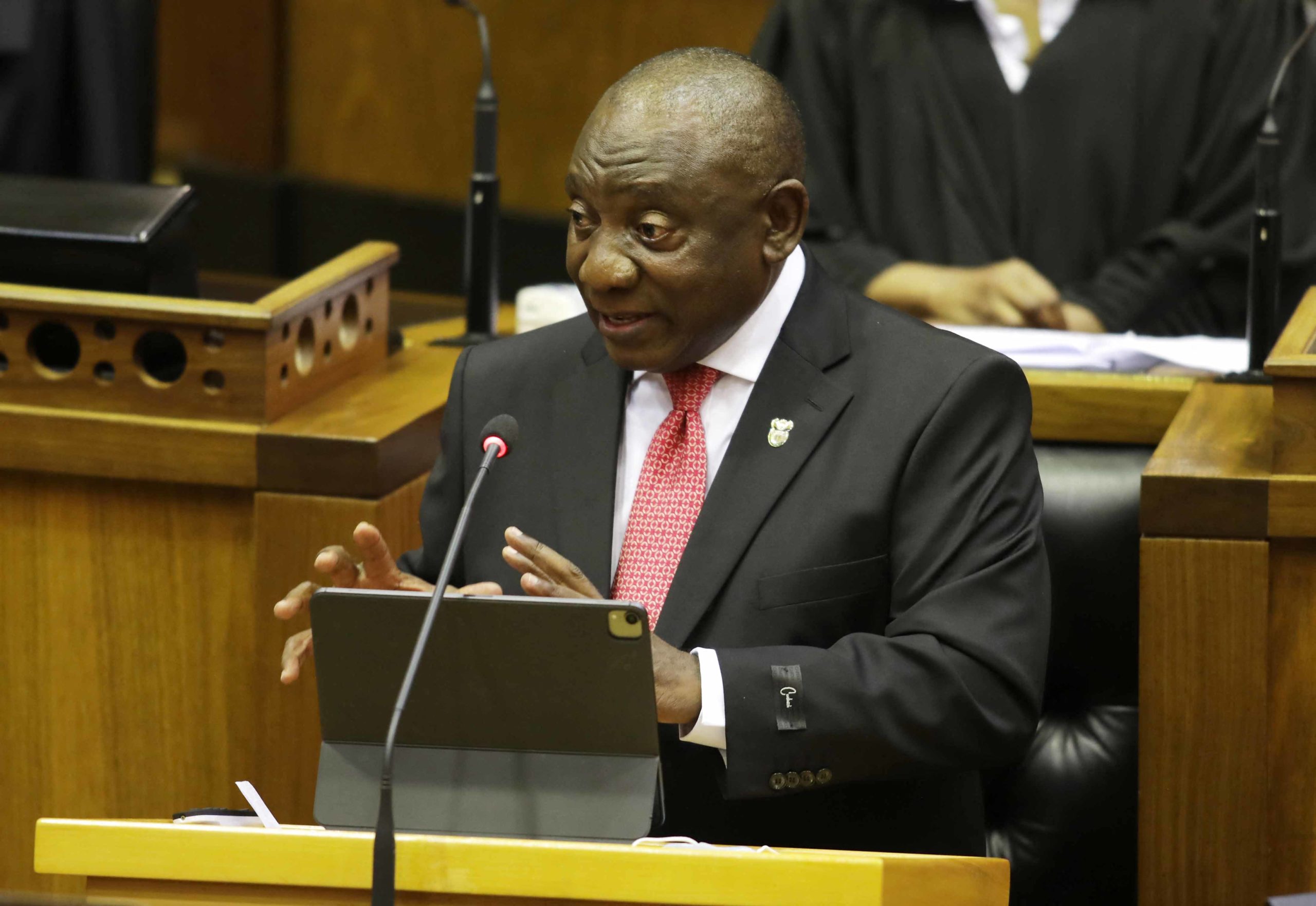Introduction
Tanzanians are heading to the polls on the 28th October. The ruling Chama Cha Mapinduzi (CCM) party has governed Tanzania since independence in 1961, and is the second longest-ruling party in Africa. President John Magufuli swept into power in 2015 with a promise to end corruption and expand infrastructure. However, his strong-handed governing style has been strongly criticised, with human rights groups and opposition parties accusing Magufuli of increasing repression ahead of the polls, intimidating political rivals and restricting the press.
Campaign rallies are in full swing, with early signs of tension between opposition groups and the ruling party. Tundu Lissu, the presidential candidate from the main opposition Chadema party, has publicly stated he believes the elections will not be free, fair or transparent. Fears have been raised by citizens about the potential outbreak of violence if the election is not held in a transparent manner and the outcome delayed.
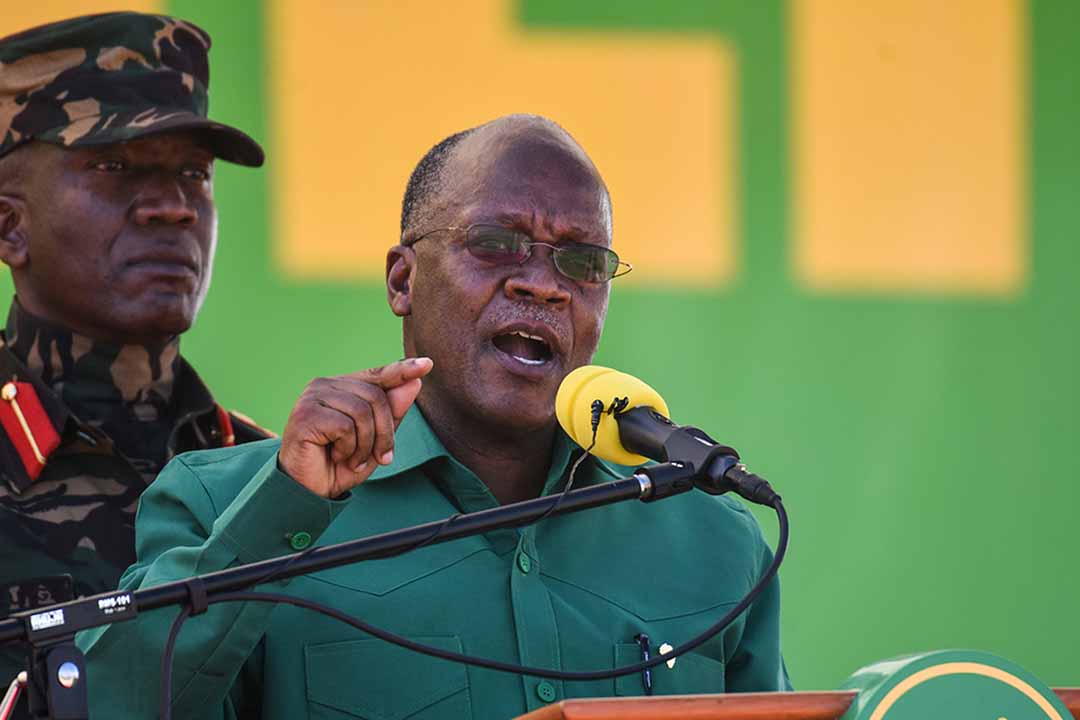
Tanzania’s incumbent President and presidential candidate of the ruling Chama Cha Mapinduzi party,John Magufuli speaks during the official launch of the party’s campaign for the October general election at the Jamhuri stadium in Dodoma, Tanzania. PHOTO ERICKY BONIPHACE/ AFP
Election Contenders
Magufuli’s main opponents are likely to be Lissu, who recently returned to Tanzania after spending nearly three years in Belgium for medical treatment after a failed assassination attempt, and former foreign minister Bernard Membe from the ACT-Wazalendo, who was expelled from the CCM in February.
Initially, opposition parties were set to head to the polls without a coalition or alliance in place to unseat the ruling CCM. Recent media reports have indicated that the country’s two leading parties, Chadema and the third biggest party in the country, ACT-Wazalendo, led by Zitto Kabwe, have decided to form what has been dubbed a “loose collaboration”, and endorse a common candidate for the polls in each region. ACT-Wazalendo’s supporters will vote for Lissu while in exchange, Chadema has endorsed ACT-Wazalendo’s candidate in Zanzibar (the island is a semi-autonomous region with the Tanzanian federation).
However, an obstacle to this loose collaboration may lie in Tanzanian law, which requires parties interested in forming an official coalition to sign an agreement at least 90 days before elections are held, and have it approved by the country’s Registrar of Political Parties. While an informal collaboration may not technically break the rules, the Registrar of Political Parties has already issued a warning to party officials against endorsing each other’s candidates.
Outbreaks of Violence
Several instances of violence have been reported in the mainstream media and social media platforms, such as:
- On 6 October, police reportedly arrested an unspecified number of Chadema opposition supporters in the Coast Region attending an alleged unauthorized rally by Lissu. Police officials claimed to be upholding Lissu’s temporary suspension of his campaign by the National Electoral Commission (NEC).
- On 7 October, Lissu was involved in a stand-off with the police for nine hours on his way to Dar es Salaam to meet with party members.
- Accusations of hired thugs and police officers led to the Inspector-General of Police (IGP) Simon Sirro ordering an immediate investigation into the claims that Serengeti Parliamentary candidate for Chadema, Catherine Ruge, was assaulted by the police officers on 14 October 2020.
- Some video clips have gone viral showing assets belonging to Chadema candidate for Chato constituency and a local party official being torched. Geita Regional Police Commander Sikoki Mwaibambe confirmed the incidents, saying a group of seven to 10 people stormed the home of the Chadema parliamentary candidate for the constituency, destroying a perimeter fence and torching a shed.
Human Rights Abuses
There have been a series of accusations against the CCM regarding human rights abuses stemming from their decision in December 2019 to withdraw its declaration from Article 34(6) of the Protocol to the African Charter on Human and People’s Rights. This declaration allows individuals and NGOs to take their cases directly to the African Court. Human Rights Watch has warned that Tanzanian authorities continue to step up repression of opposition parties, non-governmental organisations and the media, ahead of the elections.
National Electoral Commission Partiality
Tanzanian human rights activist Fatma Karume said in an interview that the National Electoral Commission (NEC) is most likely not an independent entity, and has members of the CCM party appointed as returning officers.
Election Campaign Suspensions
Despite a pledge of fairness, the NEC has suspended the election campaigning of several opposition leaders for allegedly breaching the Ethics Committee regulations by violating section 21(a) and (n) of the code of ethics for presidential, parliamentarian and councillor election elections:
- Lissu recently had his campaign activities suspended until 10 October after being accused of making seditious statements at one of his rallies. The NEC stated he was suspended from 3 October for breaching the elections code of ethics.
- ACT-Wazalendo has faulted the five-day campaign suspension slapped on the party’s presidential candidate, Seif Sharif Hamad, saying it shows the Zanzibar Electoral Commission (ZEC) is not independent. Mr Hamad becomes the second presidential candidate after Mr Lissu to have his campaigns suspended.
- Chadema’s parliamentary candidate for Kawe Constituency, Halima Mdee, was also handed a seven-day campaign suspension?.
- Mtwara Urban Constituency’s candidate Maftah Nachuma (on the Civic United Front ticket) suffered a 10-day suspension.
Election Observers Participation
Chadema’s Secretary-General John Mnyika told the media that he is concerned about the lack of permission given to a number of important international observers and local NGOs – namely the Legal and Human Rights Centre (LHRC), Tanzania Constitution Forum (TCF), the Tanzania Human Rights Defenders Coalition (THRDC) and the Tanzania Election Monitoring Committee (TEMCO) – to monitor the elections and provide voter education prior to the election day. Election observation is important because it provides additional resources in the pre-election preparation and can be an oversight mechanism to safeguard election processes involving voter registers being up-to-date, ballot materials being delivered throughout the country and the appropriate technologies being adopted to avoid election fraud. The government’s actions may result in the election outcome being contested.
In a response measure, on 15 October, the CCM sought to calm diplomats’ concerns about fairness in the run up to the election. The ruling party leadership met with envoys from various countries and assured them of fairness and legality of the polls. The CCM’s Secretary-General Bashiru Ally met with diplomats from Kenya, Mozambique, the USA and seven countries from the European Union.
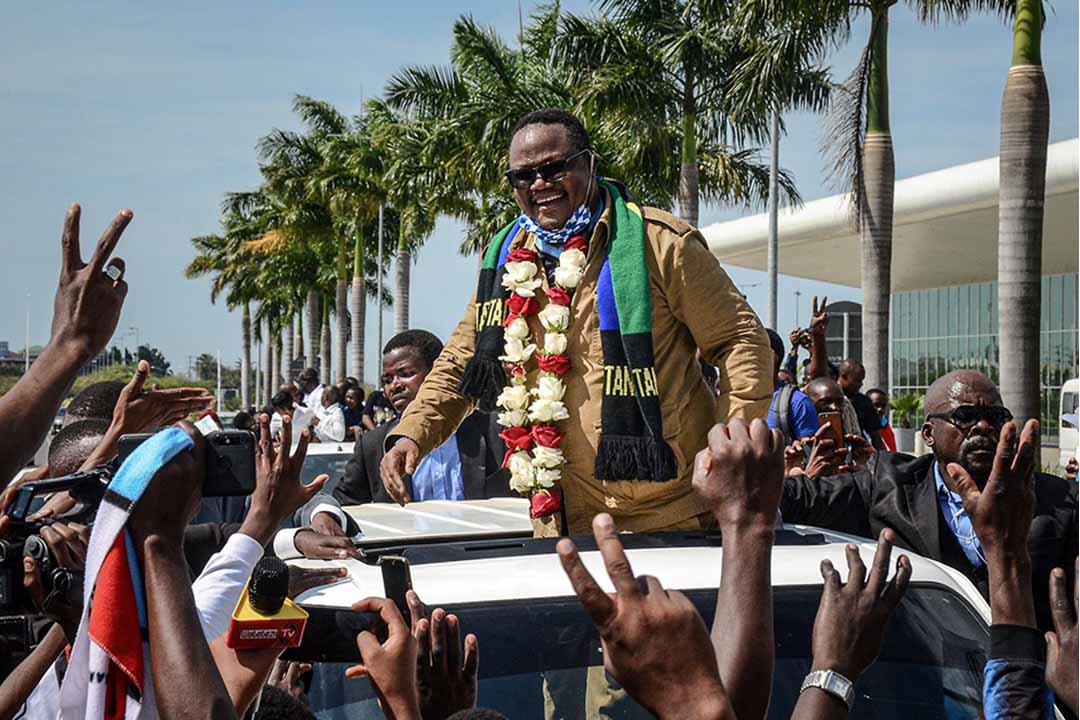
Tundu Lissu, Tanzania’s former MP with the Chadema main opposition party, who was shot 16 times in a 2017 attack, returned after three years in exile to challenge President John Magufuli in the October elections. PHOTO STR/AFP
Restricting Media Freedoms
The limiting of freedom of expression and media came into effect on August 10th, after Tanzania’s communications authority restricted cooperation between international and local media outlets. Local media outlets must seek permission to broadcast international news content, and will be punished if content is deemed “offensive”. Magufuli has defined “offensive” as anything that is contrary to his views and statements about current affairs within Tanzania. There are many reports of journalists facing harassment and detainment in Tanzania under Magufuli’s leadership.
Tanzania recently passed the Online Content Regulations 2020 that make it an offence for Facebook, Twitter and WhatsApp users to post messages which “ridicule, abuse or harm the reputation, prestige or status of the United Republic of Tanzania” ahead of the election.
COVID-19 and the Media
While the world battles with the effects of the Covid-19 pandemic, this is an opportunity for Tanzania to emulate Malawi’s successful hosting of their election earlier this year under challenging conditions. Unlike Malawi, Magufuli declared the country “coronavirus-free” thanks to prayers by citizens. A recent Al Jazeera interview with Muthoki Mumo from the Committee to Protect Journalists for Sub-Saharan Africa highlighted that it has become increasingly difficult for journalists to do their job under Magufuli’s presidency. Journalists are restricted from reporting on the coronavirus and its impact on the elections. Magufuli has positioned himself as the gatekeeper of all information related to the coronavirus pandemic in the country. As a result, the government has not updated its national statistics for the virus since June, and there have been no regulations or restrictions implemented. The citizens are effectively being denied the right to credible information on what’s happening in their country. Political analyst Aikande Kwayu wrote that the Tanzanian government’s response to the pandemic “has revealed, rather than informed, the governance style under the current administration”. Rather than cooperating and engaging with medical experts, Magufuli has cast doubt on their professionalism and taken the science into his own hands.
Incumbency Abuses
In general, an incumbent has a political advantage over challengers during an election period. The incumbent often has more name recognition based on their position of previously holding office. Incumbents also tend to have easier access to campaign finance, as well as the use of government resources that can be directly and indirectly used to boost the incumbent’s re-election campaign. In this case, the CCM and Magufuli appear to have made full use of the advantages of incumbency.
The ruling party’s campaign strategy has seen Magufuli’s face and the party’s signature green-and-yellow colours found on posters, leaflets and billboards across the country, with coverage of his campaign dominating the news. Media freedom remains restricted and is tightly controlled by the government.
As a direct result, Chadema’s blue-and-white signature colours or posters are absent on the streets and their campaign messages are missing from the airwaves. Also, the party has raised concerns about new taxes, making it considerably more expensive to produce electoral materials. In order to counter these government created obstacles, Lissu and his party have utilised the social media space, which has less government control, to grow its popularity and support.
More recently, ballot papers have been altered from the standard alphabetical order to a supposedly random sequence which sees Magufuli’s and the CCM name appear first and main opposition candidates, Chadema and Lissu, appear last.




